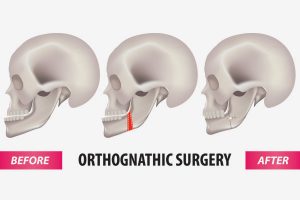I came to the clinic for surgery for a cyst growing above my upper teeth. Dr Fischer was amazing as well as my nurse, the anesthetist and the front desk staff. Follow up care was well explained. This is a fabulous clinic and state of the art surgical facility. I highly recommend!
Corrective Jaw Surgery: A Solution for Complex Bite and Jaw Problems
When your teeth don’t line up properly—or your jaws grow out of sync—it can cause more than just cosmetic concerns. You might experience difficulty chewing, breathing, speaking, or even sleeping.
At Airdrie Oral Surgery, we provide orthognathic surgery (also called corrective jaw surgery) to help realign the jaws, improve function, and create better facial balance. We work closely with your orthodontist to make sure every phase of your care is well-coordinated and successful.
What Is Orthognathic Surgery?
Orthognathic surgery involves repositioning the upper jaw, lower jaw, or both to correct structural issues that can’t be resolved with braces alone. It’s often recommended when there’s a skeletal misalignment that affects your bite, jaw movement, or appearance.
Jaw surgery is a powerful treatment that can lead to major improvements in function, comfort, and confidence.
You May Be a Candidate If You Have:
- Trouble chewing, biting, or swallowing
- Jaw pain or chronic TMJ issues
- A noticeably protruding or receding jaw
- An open bite or crossbite
- Facial imbalance or asymmetry
- Breathing problems (such as sleep apnea or chronic mouth breathing)
What to Expect From the Process
1. Consultation & Planning
We start with a full evaluation, 3D imaging, and careful measurements. Our team will explain how surgery can improve your jaw position and bite—and even give you a digital preview of what your results may look like.
2. Orthodontic Phase
Before surgery, your orthodontist will use braces to straighten and position your teeth so they’re ready for the new jaw alignment.
3. Surgery Phase
Jaw surgery is done in the hospital under general anesthesia.
- The procedure is performed from inside the mouth—no visible scars
- Plates and screws are used to hold your jaw in place
- Most patients stay in hospital for 1–2 days
4. Recovery & Follow-Up
We’ll guide you through a detailed recovery plan, monitor healing, and coordinate with your orthodontist to finish your treatment.
Benefits of Corrective Jaw Surgery
- A healthier, more functional bite
- Relief from jaw pain and tension
- Better breathing and sleep quality
- Improved facial balance and confidence
- Protection for teeth, gums, and joints over time
Want More Details?
Check out the Calgary Oral Surgery Group’s Jaw Surgery Page for additional information on procedures, timelines, and recovery.
Schedule a Consultation
If you’ve been referred for jaw surgery—or want to explore your options—call Airdrie Oral Surgery today. We’re here to walk you through the process and help you get the results you need.

